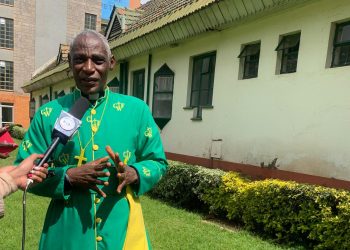By MIKE MWANIKI
The Global Fund has identified Kenya among four other African countries as potential pilot nations to benefit in a new partnership aimed at achieving Universal Health Coverage through digital technology.
The Global Fund partnership agreement with PharmAccess Foundation also identifies Rwanda, Nigeria and Ethiopia as potential key pilot countries given their commitment to achieving UHC.
According to a press release, the Global Fund announced the partnership agreement with PharmAccess Foundation to support the four African countries accelerate progress toward UHC by harnessing digital technology.
Kenya, Rwanda, Nigeria and Ethiopia have been identified by the Global Fund as potential key pilot countries given their commitment to achieving Universal Health Coverage and focus on digital technology.
PharmAccess is a Dutch non-governmental organisation with presence in Africa, dedicated to championing the development of mobile and digital technology platforms to expand access to affordable healthcare in sub-Saharan Africa.
PharmAccess Chief Executive Monique Dolfing-Vogelenzang lauded the partners and express commitment for further collaborations.
“With a focus on smart solutions, by leveraging the potential of mobile technology, together we can support African countries in improving their healthcare systems to deliver better and inclusive care for HIV, TB and malaria patients.’’
Global Fund Executive Director, Peter Sands noted: “Only through partnership and innovation can we stretch every dollar of our investments to maximise impact. Digital technology can play a key role in making universal health coverage a reality for millions of people.”
Universal Health Coverage aims to ensure that everyone, everywhere can access quality health services without suffering financial hardship. It requires removing barriers to health, and improving affordability, accessibility, and quality of health systems.
The Global Fund, the press release says, is the largest multilateral investor in sustainable systems for health, which form the foundations for UHC. The Global Fund invests US$1 billion a year on health system strengthening.
Together with partners, the Global Fund has saved 27 million lives since 2002, and the number of people dying from Aids, TB and malaria in countries where the Global Fund invests has been reduced by one-third.
Last year, Kenya and the Global Fund signed six agreements worth $380 million (Sh38 billion) to aid in the fight against HIV/Aids, TB and malaria.
The grants aim to reach 1.3 million people living HIV/Aids with antiretroviral therapy by 2021 as well as drastically expanding interventions to find more missing cases of TB amongst other interventions.
The Global Fund announced the grants would be managed by the National Treasury, AMREF Health Africa and the Kenya Red Cross Society.
At the same time, the Ministry of Health and County governments were mandated to manage the implementation of the agreements.
Global Fund estimates that around 10 million people fall ill with TB each year but only around six million are identified globally.
The Global Fund—a partnership between Governments, civil society, the private sector and people affected by the disease—is responsible for 65 percent of all international funding for critical interventions and programs dealing with all forms of TB, including drug-resistant TB.
Between 2018 and 2020, the Fund will give special attention to 13 countries that contribute to about 75 percent of all missing people with TB globally.
The countries include Kenya, Bangladesh, DRC, Indonesia, Myanmar, Nigeria, Pakistan, Phillipines, South Africa, Tanzania, Ukraine, Mozambique, and India.
The Fund is giving these countries additional $125 million to help identify missing cases of TB.
At the same time, the Fund is also working with the World Health Organisation, Stop TB Partnership and other partners to ensure these countries have the necessary tools and technical assistance to achieve the target of finding more people with TB.
Experts say using technology is at the centre of the initiative to find the missing millions.
However, pundits point out that the Global Fund needs more funding to reach the WHO target of ending TB by 2030.
They say governments need to increase domestic funding for TB and the international community needs to step up the fight against epidemics like TB by supporting the Global Fund.














